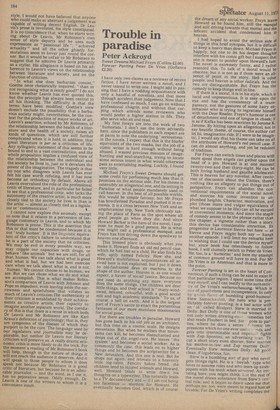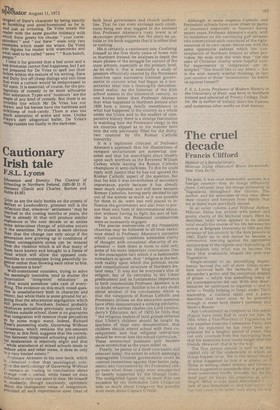Trouble in paradise
Peter Ackroyd
Sweet Dreams Michael Frayn (Collins £2.00) Forever Panting Peter De Vries (Gollancz E2.20)
I have only two claims as a reviewer of recent fiction. I have never written a novel, and I never intend to write one. I might add in passing that 1 have a nodding acquaintance with only a handful of novelists, and that more through accident than judgement. Now that I have confessed so much, I can go on without professional chagrin and without that carping which attends some reviewers who would prefer a higher station in life. They also serve who sit and read.
My first forays are into the work of two 'humorists.' I don't use the term advisedly here, since the publishers in each respect are at pains to note the underlying seriousness ' in the novels. I expect that this is the blurbs' equivalent of the two masks, but the job of a comic writer is hard enough without being abused. I wasted precious minutes of image. hunting and soul-searching, trying to locate some serious intent in what would otherwise pass as entertaining reading. Luckily, I found very little.
Michael Frayn's Sweet Dreams should, get some credit for performing much less than it promises on the serious side. For his theme is ostensibly an allegorical one, and its setting is Paradise or what people mundanely used to call heaven. In the best of all possible worlds, this would be simple fantasy, but Mr Frayn has bowdlerised Paradise and pushed it in extremis. It is a cross between New York and an amphetamine trip, New York obviously taking the place of Paris as the spot where all good people go when they die. And since Howard Barker is the hero of the novel, I suppose he must be a good person. He is what you might call a professional manqué, and Frayn has him driving down the speedway to heaven one afternoon.
This blessed place is obviously what you make it. Howard finds an old red pencil case, which he had lost as a child; He also finds his wife, aptly named Felicity. How she, and Howard's multifarious acquaintances all arrived here is not explained, but I put it down to old-fashioned deus ex machina in the shape of the author. Heaven is, as one would expect, a haven of social justice. Because no one need do anything any more, everyone does the same things. The children are dear little things, and their school is" many-windowed, relaxed, colourful, with a good social mix and high academic standards." To us, of course, a hell on earth. And it is the largest part of Frayn's satire to enact the portentious fantasies of our more mundane missionaries for social good.
For there are troubles in paradise. Howard has gone back to his old job as an architect, but this time on a cosmic scale. He designs mountains. But when he realises that mountains can kill, be becomes disenchanted and drops out of the angel-race. He leaves 'the system ' and becomes a social worker. As is commonly the case, this leads on to higher things and he becomes the scriptwriter for a New Jerusalem. And this one is real. But he drops out again, and retreats to a heavenly little log-cabin. Felicity bakes bread, the children tend to injured animals and Howard, well, Howard tends to write down his thoughts on a typewriter. This naturally leads to a TV documentary and — if I am not being too facetious — stardom for Howard. He eventually becomes God, which is of course
the dream of any social worker. Frayn leavee Howard as he found him, still the mangd
and still driving towards that mortal and maleficent accident that condemned him to heaven.
I had hoped to avoid the serious side Of things in this brief synopsis, but it is difficult to keep a heavy man down. Michael Frayn IS happily, not one to let his deeper thoughts interfere with his comic gift but I suspect that one is meant to ponder upon Howard's fate. The novel is extremely funny, and I rather resented this. To talk of a moral would be obscene, but it is not as if there were an absence of point in the story. Hell is other people, and heaven is other radicals. And the two are distinguishable. But Frayn has the comedy to keep things well in line.
If there is a moral, it is in his style, which IS lucid and unpretentious. It is easy upon the eye and has the consistency of a transparency, not the gestures of some hairy entertainer who is trying to ingratiate himself with the Dear Reader. Frayn's humour is one of detachment and one of tongue in cheek; it is as if Kafka has been rewritten by Jerome K. Jerome. By hitting upon an allegorical, not to say beatific theme, of course, the author can let hk imagination ride. If I were to be imagistic. I would say that his theme can take on all the attributes of Howard's red pencil aase, it can do almost anything, and yet be redolent of tradition.
For Frayn can switch times and places with more speed than angels can gather upon the head of a pin. Howard is at one moment twenty-two and then thirty-eight. He can be both loving husband and gauche adolescent. This is heaven for any novelist. After centuries of discussion about the Unities, there's nothing like an allegory to put things out of perspective. Frayn can abandon the conventional requirements of the social novel, and exercise his comic invention to unplumbed heights. Character, motivation, and plot (those inane and vulgar equivalents of what we suppose to be life) can all be excised at convenient moments. And since the staple of comedy seems to be the phrase rather than the chapter, a vignette rather than a story, this device has considerable attraction. Its progenitor is Laurence Sterne but here — as Sterne and Frayn might both say — hangs another episode. I will limit my remarks here to wishing that I could use the device myself but, since book has relentlessly to follow book, I will clumsily switch to Peter de Vries. He, too, is a ' humorist' and here my attempt at common ground will have to end. For Mr De Vries is an American and that is more to the point.
Forever Panting is set in the heart of Connecticut, if such a thing can be said to exist in that particular region. I spent some time that way myself, and I can testify to the authenticity of De Vries's weitanschauung. Which is one of gaucheness and incompetence, lit only by g;'1611 flarfq of bumbling good-humour. Stew Samackaafelt, the hero who is predictably forever panting, is a bad actor with an ' Id' called Blodgett. Stew is married to Dolly. But Dolly is one of those women who not only writes drawing-roa aomedies but also reads Flaubert in bed. Ste goes to par
ties, where he does a series comic im
pressions which no one ever unc.,. rids, and gets into interminable and impott..;i,. fights with Zap Spontini, an advertising loan. To cut a short story even shorter, Stew marries his mother-in-law and Zap marries Dolly. Eventually Stew remarries Dolly. All good clean, if lugubrious, fun.
Stew is a bumbling sort of guy who never gets things right. He is a 'boyish 'type who loves to assume roles and who tears up newspapers with his teeth when annoyed. An irritating bore, you might think. I.. at the rest of the novel draws substance from Stew's central role, and it began to dawn upon me that perhaps we. too, were meant to regard him as lovable. For De Vries's writing completes the
tangent of Stew's character by being exactly as bumbling and good-humoured as he is. And just as irritating. De Vries treats the reader with the same gauche intimacy with Which Stew greets his chums: "your correspondent " and "our Stew" were only two examples which made me wince. De Vries also regales his reader with wisecracks and What used to be called "saws ": " Rum bunch, People."
I take it for granted that a bad actor and a bad dramatist cannot find happiness, but I am not prepared for De Vries to spell out their failure within the texture of his writing. Stew and Dolly live off cheap dialoge and exit-lines that even a curtain would be embarrassed to fall upon. It is essential, of course, for the protagonists of comedy to be more silhouette than substance. Types and' humours' are the staple of any kind of comedy. But there is an invisible line which Mr De Vries has not drawn, and his heroes have the hardness and sickliness of rock-candy. There is also too Much alteration of scene and tone. Unlike ‘1",aYo's deft allegorical ballet, De Vries's Wings rumble too loudly in the darkness.



































 Previous page
Previous page